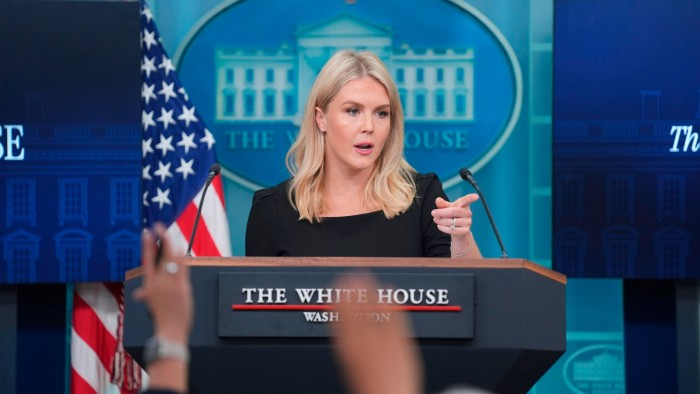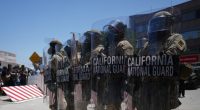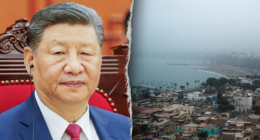Share this @internewscast.com
Donald Trump has indicated the potential for new discussions with Iran “in the near future” and mentioned that he would make a decision regarding joining Israel’s assault on the nation “within the next two weeks.”
This announcement by the US president on Thursday suggested a possible delay in his decision concerning involvement in the conflict, even as American military resources are swiftly advancing to the area amidst concerns of an impending escalation.
“Considering the likelihood of negotiations that may or may not occur with Iran soon, I will decide whether or not to proceed within the next two weeks,” announced the president in a statement read by White House press secretary Karoline Leavitt on Thursday.
Leavitt also said that the US had kept open its negotiations with Tehran during days of missile exchanges between Iran and Israel.
“Correspondence has continued,” Leavitt said in response to a question about whether Trump’s envoy Steve Witkoff had been in contact with Iranian officials.
The comments from the US came after seven days of conflict, which began when Israel launched an attack on Iran in what it said was a bid to destroy the Islamic republic’s nuclear programme.
The US has assisted Israel in shooting down Iranian missiles fired at its ally and the Pentagon is rushing more military assets to the region, with speculation mounting that Trump was preparing to authorise bombing raids to hit Iran’s Fordow nuclear facility.
On Wednesday, Trump said he was considering strikes within days. “The next week is going to be very big — maybe less than a week,” he said.
David Petraeus, the retired general who led the CIA and US Central Command, said the decision to wait two weeks was a “pretty good call”. It would give more time for a second US aircraft carrier, the USS Nimitz, to move from the Indo-Pacific to the Middle East, he said.
“There are other actions they may want to take, such as to move more air and ballistic missile defence [systems] into position, ensure all the munitions are in place and also do some rehearsals,” Petraeus told the Financial Times. “It’s also reasonable to give diplomacy a last chance.”
The possibility of more US-Iran negotiations comes as Britain, France and Germany prepared to hold talks with Iran’s foreign minister on Friday in Geneva, as part of the last-ditch push to prevent escalation of the conflict.
“It’s better dealt with by way of negotiations than by way of conflict . . . The risk of escalation across the region is obvious,” UK Prime Minister Sir Keir Starmer said on Thursday. He added that the UK “completely” recognised Israel’s right to self-defence, “but the principle is that we need to de-escalate this”.
European capitals have stepped up contingency plans for the US entering the conflict since Trump acknowledged on Wednesday he “may” enter the war.
But UK foreign secretary David Lammy is expected to deliver a message to Iran from the US that a path to a diplomatic solution is still possible. Lammy and Peter Mandelson, the UK’s ambassador to Washington, met US secretary of state Marco Rubio and US Middle East envoy Steve Witkoff at the White House on Thursday.
Lammy wrote on X later on Thursday that the situation in the Middle East remained “perilous”. But he added: “A window now exists within the next two weeks to achieve a diplomatic solution.”
There remains pessimism, however, that Iran will be willing to do a deal, with people close to the talks warning that military action from the US “remains firmly on the table”.

The gathering in Geneva with Iran’s Abbas Araghchi is a revival of the “E3” format, under which Britain, France and Germany — the European signatories to a 2015 nuclear accord Tehran signed with world powers — have sought to resolve the country’s stand-off with the west.
The aim of the meeting would be to agree a framework to restart monitoring of Iran’s nuclear programme, but with international monitors granted unfettered access to facilities. Another point of discussion will be whether Iran would be willing to make a commitment to cut its ballistic missile stockpile.
A crisis over Iran’s nuclear programme erupted after Trump unilaterally withdrew from the accord in 2018. Tehran responded by expanding its activity and has been enriching uranium to levels close to weapons grade, although it says its nuclear programme is purely for civilian purposes.
The Trump administration held five rounds of indirect talks with Iran before the diplomatic process was upended by Israel launching its strikes on Friday — days before a sixth round of negotiations was scheduled.
Israeli Prime Minister Benjamin Netanyahu, who opposes the diplomatic efforts, said he launched the war to prevent Tehran developing nuclear weapons.

Iran’s foreign ministry confirmed that Araghchi would meet his British, French and German counterparts, the first high-level face-to-face diplomacy with Tehran since Israel launched its attacks on Iran.
French foreign minister Jean-Noël Barrot told journalists on Thursday: “We have expressed our willingness to take part in negotiations aimed at securing from Iran a lasting rollback of its nuclear programme and its ballistic missile programme.”
He said: “Negotiation remains today the only way to achieve a lasting rollback of Iran’s nuclear and ballistic missile programme.”
The E3, which was heavily involved in efforts with the Biden administration to revive the 2015 accord, has been largely marginalised by Trump as he has sought to pressure Iran into a new deal.
Additional reporting by Guy Chazan in New York





